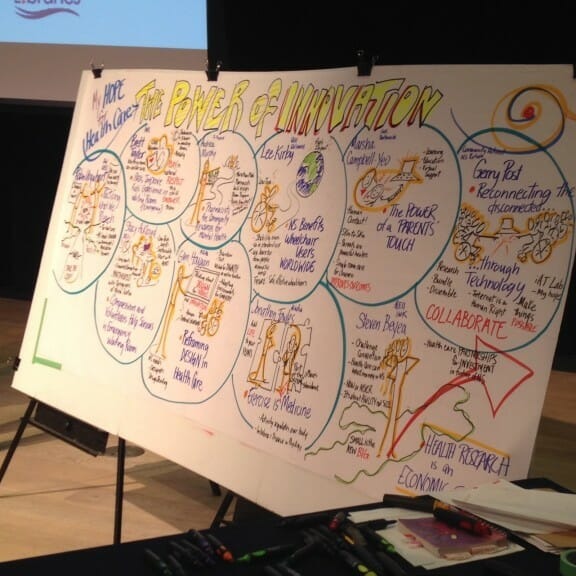
Doctors share ways to improve health care system
Improving waiting rooms and integrating research into clinical practice were among the topics discussed at forum on innovation
Outcomes for cancer patients could improve by at least 30 per cent if scientific research evidence were used regularly in the healthcare system, a Dalhousie professor told audience members at the Halifax Central Library on Oct. 26.
“All this scientific research is being done at home, right here in Nova Scotia – but our healthcare system does not use all of the information. It also takes about 17 years before evidence can be placed into practice,” said Dr. Robin Urquhart.
The library hosted a panel discussion called Research and Innovation in Health Care Forum. The panel included 10 speakers who each brought up issues with the healthcare system and their ideas to improve the system for the community. At least 300 community members showed up for the event.
Speakers had around seven minutes to get their point across.
Urquhart, one of the first speakers, discussed the gap between scientific evidence and healthcare practice.
“There is a gap between what is known, published, and what is actually done in health care. We often call this gap the research-to-practice gap,” said Urquhart.
Urquhart is a scientist at the QEII Health Sciences Centre and an assistant professor in the department of surgery at Dalhousie University. Her research focuses on understanding how scientific evidence becomes clinical practice.
Urquhart said studies around the world have shown that 30 to 45 per cent of patients do not receive care consistent with scientific evidence. Placing evidence and working it into the healthcare system takes a long time and requires a lot of patience since it could take up to 17 years or more.
“Sometimes the evidence itself just doesn’t fit the setting because it is the wrong size. Sometimes, health care providers and patients are unaware of the evidence or maybe don’t know its value or just really don’t know how to use the evidence to work for them,” said Urquhart.
Emergency waiting rooms at the IWK
Dr. Brett Taylor spoke about improving waiting rooms for children.
“Kids get scared and cranky while waiting and this can make it hard for a doctor to provide them with the help that they need,” said Taylor. “They also fret and get bored. We have toy areas for them to play in, but those are just germ-infested.”
Taylor works in the emergency medicine department at Dalhousie University and is a pediatric physician at the IWK Health Care Emergency Department.
His solution to this problem has been to give an iPad with an educational app to children who come into the emergency department.
Playing is a natural part of childhood, stated Taylor and with this device, children can still have fun while waiting to get seen by a doctor.
“It is reassuring to the child,” said Taylor. “If a child has a cut, the game can show them how awesome blood is and how the cut heals.
“We have an app to measure their pain. If the pain is high the system will automatically notice this and will notify the nurses,” said Taylor.
Overall, this gaming system has been proven to decrease stress in children and has been a tool to decrease their pain as well while waiting in the IWK emergency room, he said.
Other topics that were brought up during the event included improving interior designs in hospitals, using exercise as a source of medicine, working with disabilities and bringing healthcare into economics.






